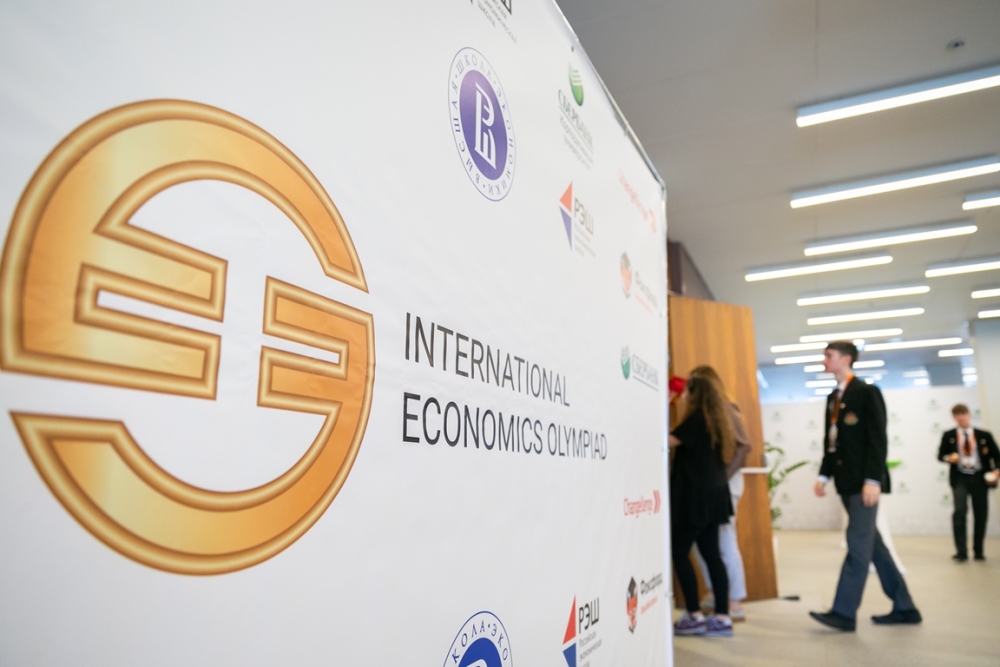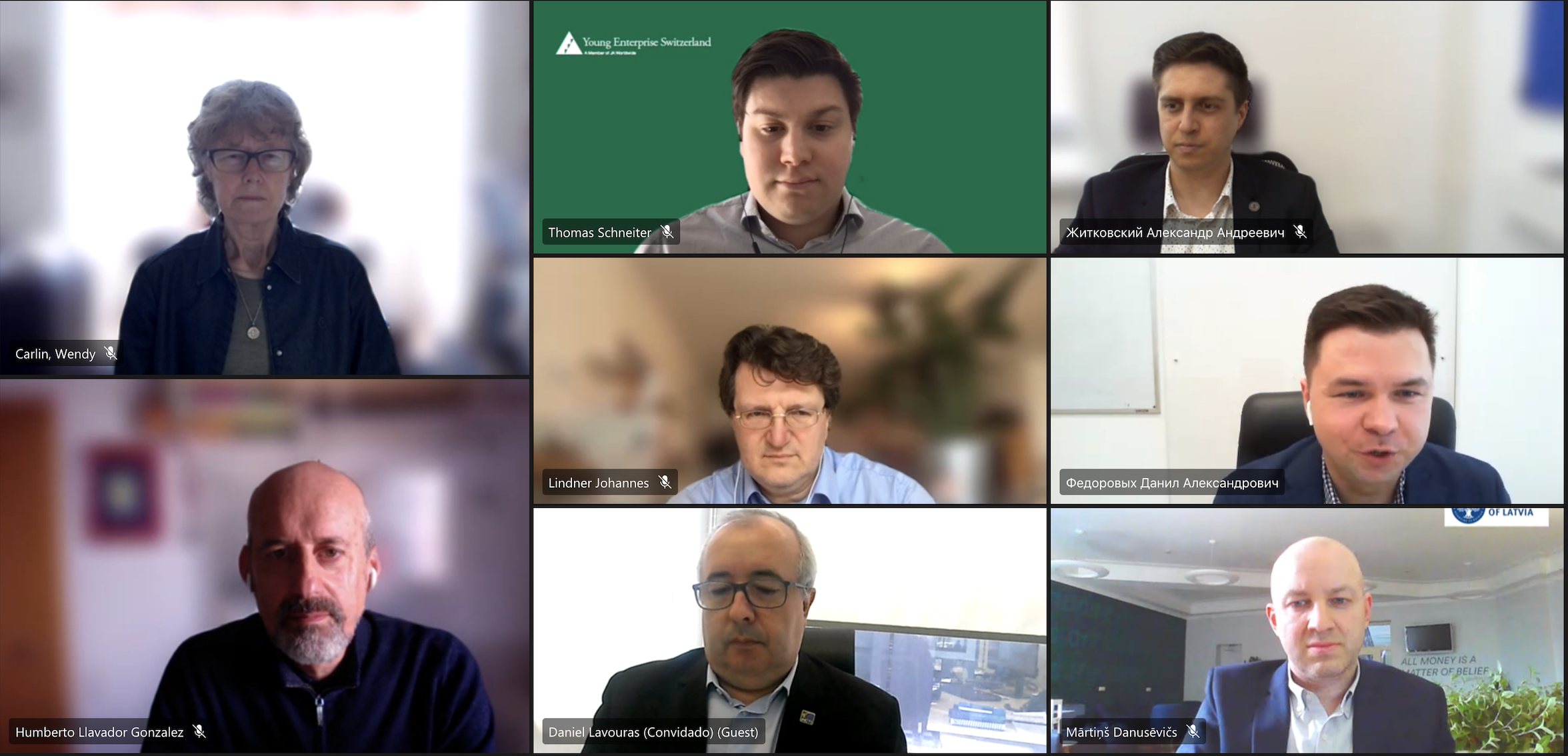‘Not Testing the Knowledge, But Testing Whether You Are Ready to Interact with Reality’

The roundtable "Teaching Economics to High School Students: Curricula, Practices, Competitions" took place as part of the XXII April International Academic Conference on Economic and Social Development. Danil Fedorovykh, Deputy Vice Rector of HSE University and the President of the Executive Board of the International Economics Olympiad (IEO), initiated the session. Alexander Zhitkovskiy, Head of the Project Laboratory for Development of Intellectual Competitions in Economics (Faculty of Economic Sciences, HSE University), was the co-moderator.

Experts from seven countries discussed several topics related to the objectives and goals of teaching economics, finance, and entrepreneurship to high school students. Speakers are actively involved in the international development of teaching economics as they are the organizers of national Olympiads in Economics, Finance and Entrepreneurship in their countries. These Olympiads are the qualifying events for the International Economics Olympiad (IEO).
The International Economics Olympiad (IEO) is an annual competition in economics organized for high school students. The olympiad aims to attract students interested in economics, business, and finance and engage them in creative problem-solving. The IEO was initiated by HSE University and first held in Moscow in 2018, becoming the first event of its kind in the world. The next Olympiad will be held from July 26 till August 1, 2021 and hosted by Latvia.
The first objective of the panel was to define the goals of teaching economics to high school students. Johannes Lindner (University Teacher College Vienna/Krems & e.e.si Austrian Ministry of Education, Science and Research) stressed that learning economics is closely related to learning attitudes. In his opinion, it helps students answer the question, "How can I contribute to society as its member and as a citizen?". Humberto Llavador (University Pompeu Fabra, Spain) emphasized that all the children, whether they are going to study economics at university or not, should be literate in Finance and possess special tools to prevent them from being manipulated. Martins Danusevics (University of Latvia) also noted that teaching economics helps children become competent decision-makers as consumers, employees, and employers and make the right choices based on their knowledge of economics.
Economics concepts or skills related to economics that every person should know by the time they finish high school (according to Humberto Llavador):
- concepts of inflation and unemployment
- ability to read graphs properly
- "intentions and incentives matter"
- "information is important"
The second important topic discussed was the methods of teaching and ways of learning in post-COVID times. Wendy Carlin, professor of University College London, shared the poll held by the CORE Project among 3,604 students from 18 universities in 10 countries. The question was, "What is the most pressing issue that economics should address?". Though inequality remains the most pressing concern, students are also concerned about the COVID-19 recession.

Professor Wendy Carlin is one of the people behind the CORE Project. As described by Danil Fedorovykh," the CORE ECON is one of the most significant things that happened to Economics education around the world during the last decade. One of the primary sources recommended to the participants of the International Economics Olympiad".
Thomas Schneiter, one of the organizers of the Swiss Economics Olympiad (which is very practice-oriented), mentioned more blended learning and breaking out of both the classrooms and the classic structure of the lessons as the main changes that the pandemic made to teaching.
The question of whether the intellectual competitions in economics should test theoretical knowledge or the way of thinking or knowing how economies work was also in the centre of attention. Danil Fedorovykh shared one more competition currently developing in Russia: the so-called "Olympiad in Practical Economics".

Danil Fedorovykh, Deputy Vice Rector
Apparently, the Russian system of olympiads and Russian system of economic education in high school are among the most advanced in the world. Still, the tasks are often too academic and theoretical. In my view, rather than testing the knowledge of theory, they should be (at least in some part) practice-oriented and test analytical skills and curiosity. That's why there are the business case and financial literacy parts in the IEO. That is also the reason why we plan to launch a new national competition in 'practical economics' in Russia.
Daniel Fonseca Lavouras from the Ministry of Science, Technology and Innovation of Brazil told about how the National Olympiad in Economics in Brazil - OBECON - is held.
In the first round, the organizers try to involve as many schoolchildren as it is possible. To do so, they use colourful advertisement materials and try to make tasks easy and understandable. The level of difficulty increases with each following round, but the same happens with the motivation of the сontestants. "The treasure of the system is the base, and if we have a strong base, we will end up having a world-class team representing us in the international competition".
Martins Danusevics pointed out that economic knowledge should not be a privilege of few and become a mandatory lesson in high school globally. According to him, Latvia is moving to the educational model where Economics is taught from the first grade as a part of social sciences. He also indicated that Latvia has a positive experience of collaboration with industry and partners outside of the educational field (e.g. Bank of Latvia).
As for the interactive tools and resources to help teachers and learners, Humberto Llavador recommended the e-book "Experiencing Economics" by CORE Project. It contains all the necessary information about how to run experiments that will contribute to a better understanding of Economics and help students by being not the receivers of information but its sources. Wendy Carlin demonstrated interactive data-based resources such as the simulator of the effect of social distancing policies on virus transmission, the economy, and income inequality or the "Our World in Data" website.
The panel discussion became an excellent opportunity to exchange global experience in teaching economics in different regions of the world. With the complete agreement of the participants, the session gave rise to a series of thematic meetings.
Alexandr Zhitkovskiy
Head, Project Laboratory for Development of Intellectual Competitions in Economics
Danil Fedorovykh
Deputy Vice Rector
